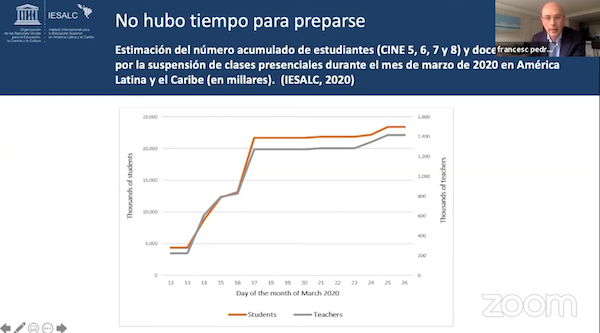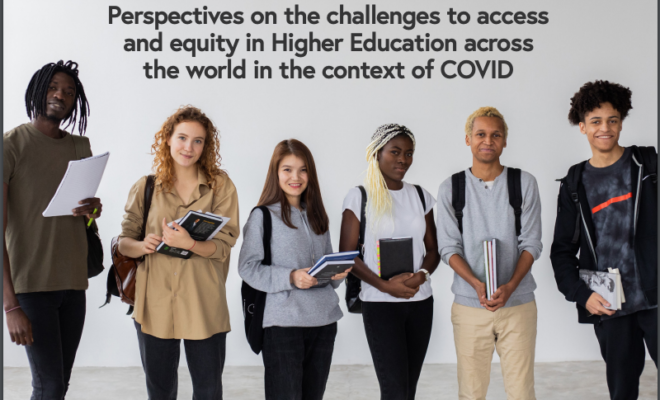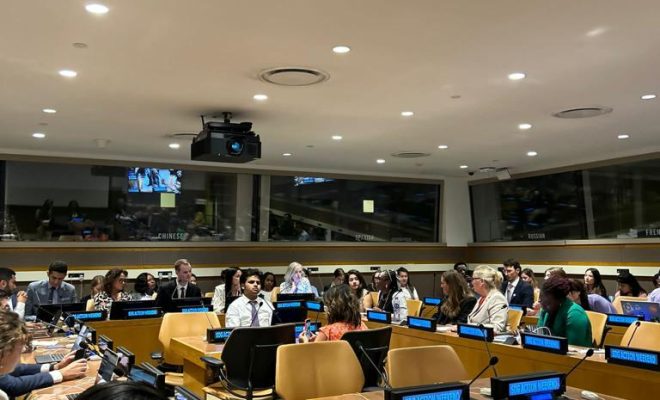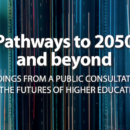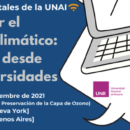New report unveils financial aid measures taken in the region for higher education students during the pandemic

- In the region, more than 50% of higher education tuition is financed by households. In Chile, Brazil and Peru, these percentages are 84%, 75% and 70% respectively.
- While Chile devotes 19% of public investment to directly finance higher education institutions and 81% for the direct financing of students, Peru devotes 90% and 10% of its resources to finance supply and demand, respectively.
- During the pandemic, more than 60% of the public HEI and 90% of the private ones announced tuition discounts.
The inrush of COVID-19 has impacted higher education in Latin America. The economic crisis unleashed by the pandemic is widely affecting university enrollment in the region. In Colombia, preliminary figures show a drop in university enrollment of more than 11% in the second semester of 2020, compared to 2019. With no complementary subsidy and financing tools, many students, especially those from middle or low income sectors, or countries with high prevalence of private enrollment, will either not be able to access higher education or will drop out of it.
In this context, what policies and measure have countries adopted in order to provide financial support to the region’s university students amidst the pandemic? How does this support differ according to the configuration of national higher education financing schemes? How is support from the government complemented by educational credit institutions (ICE, acronym in Spanish) and higher education institutions (HEI) to respond to the financial needs of the students?
In order to analyze the special measures that the main actors of financing higher education have adopted to support students during 2020, the Inter-American Development Bank, the Asociación Panamericana de Instituciones de Crédito Educativo APICE (Pan-American Association of Educational Credit Institutions), and the UNESCO International Institute for Higher Education in Latin America and the Caribbean (IESALC) conducted the study Educación superior y COVID-19 en América Latina y el Caribe: Financiamiento para los estudiantes (Higher Education and COVID-19 in Latin America and the Caribbean: Financing for students) officially launched on July 9, 2021.
The publication is based on the results of a regional survey aimed at the public and private actors responsible for financing higher education in 11 countries of the region: Argentina, Brazil, Chile, Colombia, Costa Rica, Dominican Republic, El Salvador, Honduras, Mexico, Peru and Uruguay.
According to the survey, five of the seven participating governments took measures to aid HEI during the period of confinement, and three reported having designed new programs for their post-confinement financing or financial relief. These measures include financial aid (extraordinary direct transfers and redirection of financial resources), and non-financial aid (help with physical, technical and teaching resources).
Among the study’s main findings we have that more than 60% of the public HEI and 90% of the private ones announced tuition discounts, and some of them proposed virtual internationalization strategies with partner universities abroad in order to encourage students to stay on.
On the other hand, none of the surveyed countries, with the exception of Chile and the Dominican Republic, have government programs of direct financial support for private HEI. Only public HEI received extraordinary direct aid in these countries, even though, on average, more than 50% of higher education enrollment in the region is private. The survey also shows that public HEI have a high financial dependence on government resources (61% of total resources, on average), while private HEI have a high dependence on the fees or tuition paid by students (84% on average).
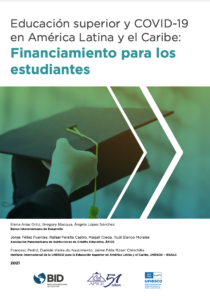 Sustainable recommendations for action
Sustainable recommendations for action
Through concrete examples represented by the initiatives of this study’s actors, the report proposes recommendations based on best practices in the flexibility in financing, the implementation of innovative and sustainable financial instruments, and the promotion and creation of partnerships and joint programs.
In the area of financing, the report recommends governments to incorporate innovative adjustments in the subsidies for HEI in order to make access to both public and private institutions more viable; to promote credit lines for ICE and HEI with lower interest rates and longer terms in order to support the financing of higher education; to guarantee credits from multilateral banks’ external loans to support ICE as a mechanism for direct financing to students.
For higher education institutions, it recommends: to diversify their sources of income to reduce financial risk in the context of the crisis, for example by offering public and private consulting services; to expand the educational offer through innovation and digital transformation, incorporating short courses and digital certifications in line with the new trends and needs of production and society.
On the matter of the implementation of innovative and sustainable financial instruments, the report recommends: the implementation of scholarship models with shared responsibility to encourage student access and permanence; the adoption of strategies to support student loans with solidarity models as an alternative for those who do not have co-debtors or guarantors; income-contingent repayment loans, allowing fees to rise and fall according to the borrower’s income; and the improvement of the university educational and graduate management systems in order to have information on income, student monitoring and early alerts, to provide academic and psychological support for at-risk students, among others.
Regarding the promotion and creation of alliances and joint programs it highlights the importance of strengthening inter-institutional work for the deployment of common strategies resulting in models of attention to students through actions aimed at improving access and avoiding desertion, with credit systems that favor the student.
Download the full report here (available only in Spanish)
RELATED ITEMS
